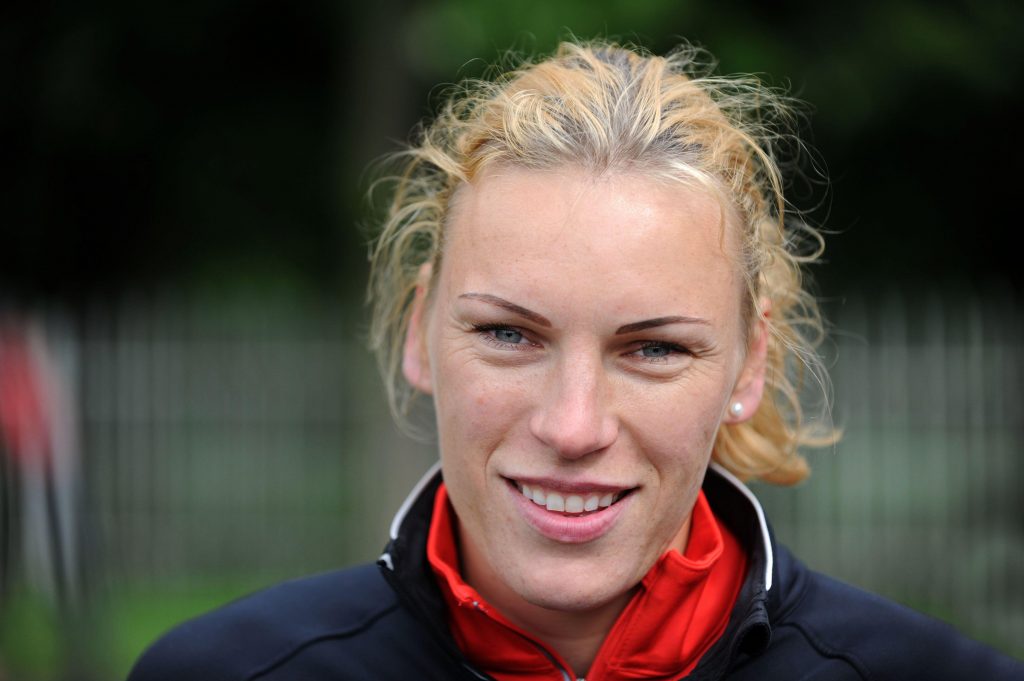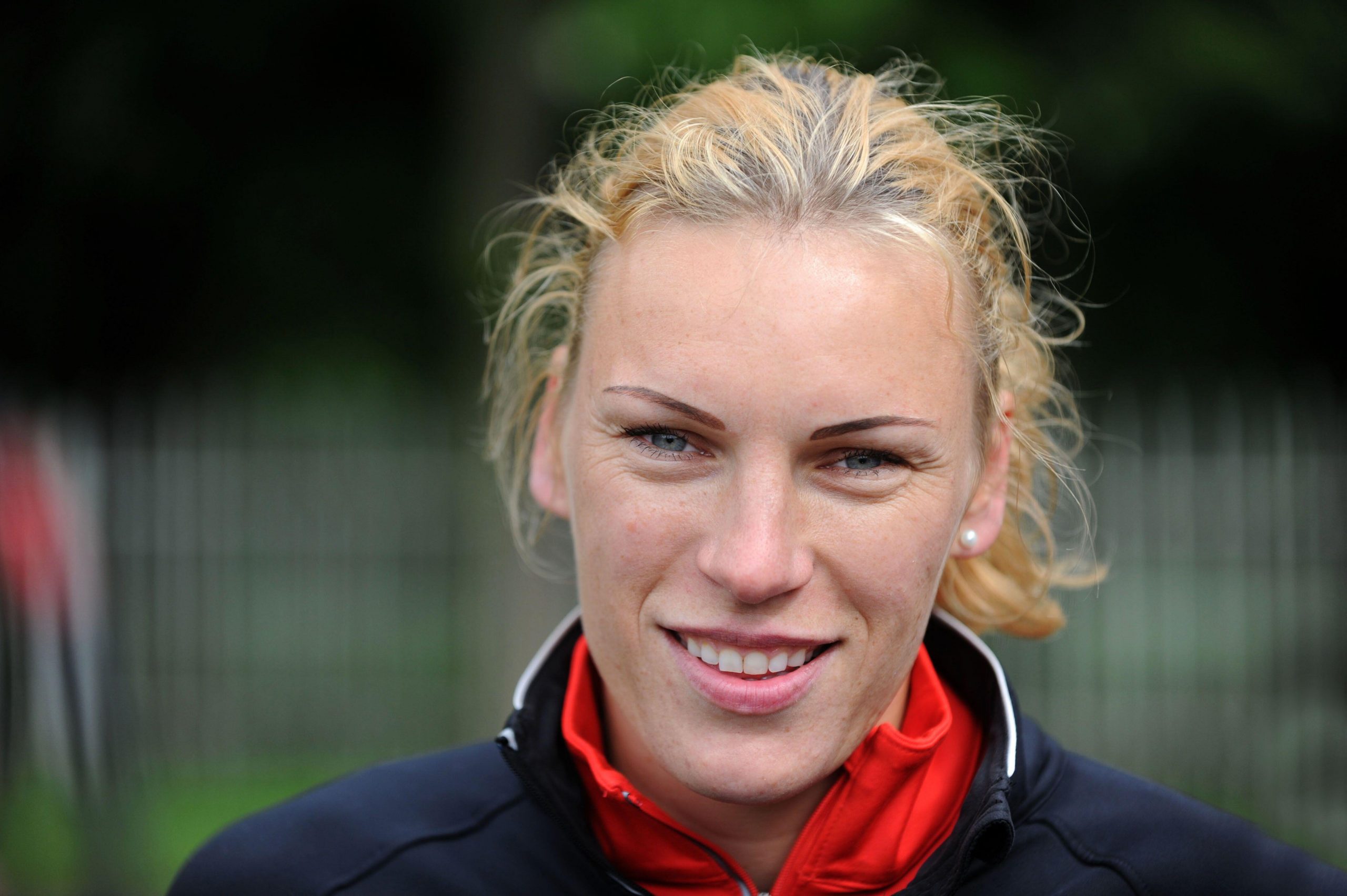There are some athletes for whom a second name is not required to be instantly recognisable in their field.
Ashton. Carolina. Roman. Nafi. Daley.
And Austra.
Austra Skujytė took her first competitive steps during the golden age of heptathlon. She was of the generation that shone in the hinterland of Jackie Joyner-Kersee, and which included Denise Lewis, Carolina Kluft, Natalya Dobrynska and Jessica Ennis-Hill. From her Olympic debut in Sydney 2000 as a 21-year-old, collecting silver at the Games in Athens 2004, to London 2012 where she was an Olympic bronze medallist robbed of a podium. She and her counterparts were the inspiration for those young athletes competing alongside her who would go onto win global medals, such as Laura Ikauniece, Ivona Dadic and Katarina Johnson-Thompson.
Austra’s astounding longevity spanned four Olympics, six World Championships and a lot of European Cup Combined Events team competitions. Her career straddled training at home in Lithuania and life as a student-athlete in the tough NCAA structure. Her range was phenomenal. Skujytė won global medals over five events in the pentathlon indoors, at seven events in the heptathlon outdoors, she competed at the highest level in the heavy throws and – as the one of the great, iconic decathletes of Europe – she is the world record holder in the decathlon.
THE COLLEGE ATHLETE
Austra’s elite career in combined events began in 1998 at the World Junior Championships in Annecy, France, where she finished sixth in the heptathlon with a score of 5606 points. A year later she competed at her first European Cup Combined Events team competition in Belgium. The Cup – which was discontinued by European Athletics in 2019 – was structured into several leagues reflecting the depth within countries, rather than the talent of individual athletes.
Lithuania typically competed in the second league and Austra finished second in the 1999 edition of the heptathlon, improving her PB to 5724. Her first 6000-plus score came in 2000, again at the European Cup, this time in Denmark where she won the competition in 6104 to qualify for the Olympics. That chain of events would set the scene for a move to the USA.
“In 2000, when I competed at the Sydney Olympic Games, Sheila Burrell was training at the time at Kansas State with Cliff Rovelto” Austra recalls. “She talked to me about the US and talked to the coaches interested. So, I gave her my contacts, and that’s how I ended up there.”
“I was the only Lithuanian. But there was a family where the woman was originally from Lithuania. So, I had a family: half-Lithuanian, half-American where I could go and enjoy the spirit of Lithuania.”
At Kansas State, Skujytė continued to flourish, and quickly started collecting titles. In 2001 she won the Big 12 Conference and then the NCAAs in heptathlon. She travelled to Europe in the summer where she won bronze at the European U23 championships in Amsterdam, and then returned west to place sixth at the World Championships in Edmonton, Canada.
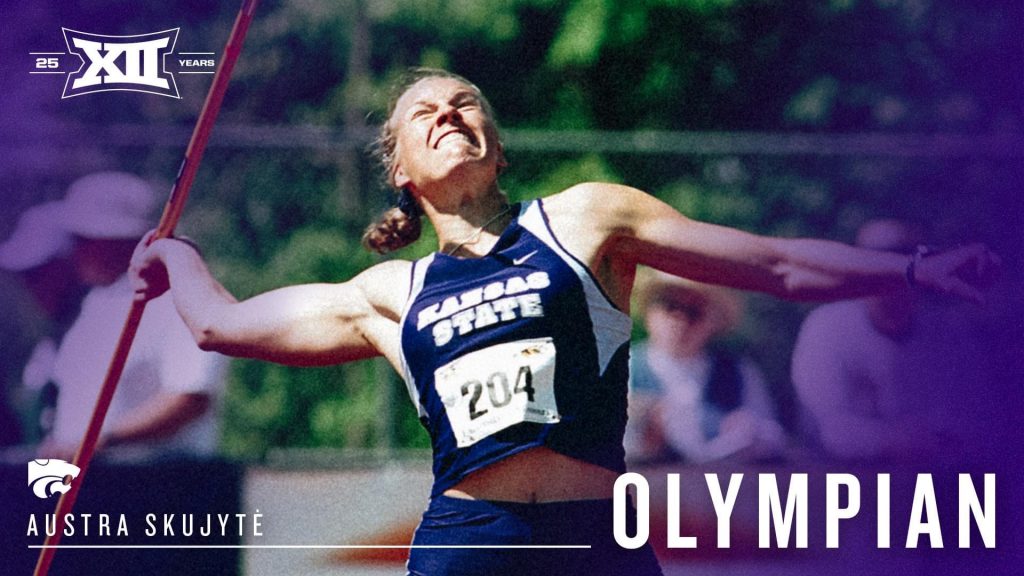
In 2002, she secured her second NCAA title, took another win at the European Cup in Slovenia, finished fourth at the European Championships in Munich and second in her first Decastar in Talence. In 2003 Austra had her first outing in Götzis, where she finished second, and she completed her season with 10th place at the World Championships in Paris.
The NCAA system can provide significant opportunities for athletes, but the intense schedule during the school year can be daunting, particularly so when athletes like Skujytė are also navigating the summer combined events circuit and the big championships.
“Coach was always planning for the summer competition, the international ones, to be the most important ones,” Austra explains. “So, all the rest were on the way to the major ones. There were a lot of workouts and competitions, though, it was a real challenge. I had practice six days a week and sometimes two practices per day – sometimes eleven practices per week.”
“At the beginning it was a little rough, but I came from a coach in Lithuania who also pushed me to work hard. After I got used to it, it wasn’t difficult.”
After graduating with her degree in kinesiology, Austra stayed on in Kansas for a further two years, working as an assistant coach, and continuing to train and compete.
“Nothing changed too much. There was a little less competition: no Big 12, no NCAA. But we were still competing in the Drake Relays, and in competitions that accepted post-collegians. And of course, we still had the major summer competition.”
“My training was the same, and I could do my workouts in my work time as an assistant coach. That was really good. But it was also exhausting, because you do these five work days, and then we don’t have a weekend. On the weekend you have to travel with the team to the competition; as a coach you had to be there and help and do things for the team. Then you come back, and it is Monday and training again. And after a while, I was a little exhausted from that – when I was a student it was not so complicated!”
THE THROWER
The demanding schedule seemed to agree with her, and in 2004 Austra went to her second Olympics. After a consistent few years around 6200 points, she stepped up to score 6435 points and win silver in Athens, just 11 points ahead of Great Britain’s Kelly Sotherton in bronze. The gold medal was won by the great Swede Carolina Kluft, one of only four athletes to ever exceed 7000 points in heptathlon. Kluft’s score on that occasion was 6952.
In the years following the 2004 Olympics, Skujytė continued to participate at the top end of heptathlon, with fourth place at the 2005 World Championships Helsinki and sixth in Osaka in 2007. She also experienced success at the pentathlon indoors. She won bronze at the World Indoors in Budapest in 2004, was fourth at the European Indoors in Birmingham in 2007, and fifth at the World Indoors in Valencia in 2008.
Having survived her intense college years with little in the way of physical problems, in 2008 injury took Austra in a different direction. “In 2008 I had some achilles problems and my shoulder was really messed up. I couldn’t throw the javelin. It was a tough year.”
She made it to the Beijing Olympics in 2008, but she failed to register a mark in the long jump, the first event of the second day of heptathlon. Usually that would be a devastating moment for a combined eventer, but Skujytė was sanguine about the situation.
“My third scratch in the long jump wasn’t very much. I wasn’t so obsessed with it, though, because I knew I would have to go through pain in the javelin, and the 800m was never my favourite. I knew my overall performance was not going to be great.”
“So, after that year, I decided to become a shot putter. I was throwing disc and doing shot put a lot those two years.”
Austra’s heavy throws had always been her star events. She focused her attention on them and between 2008 and 2010 she improved her shot PB from just over 17m to 17.86m outdoors and 17.63m indoors. Her discus PB at college had been over 51m, and she improved that further to beyond 53m in 2009 and 2010.
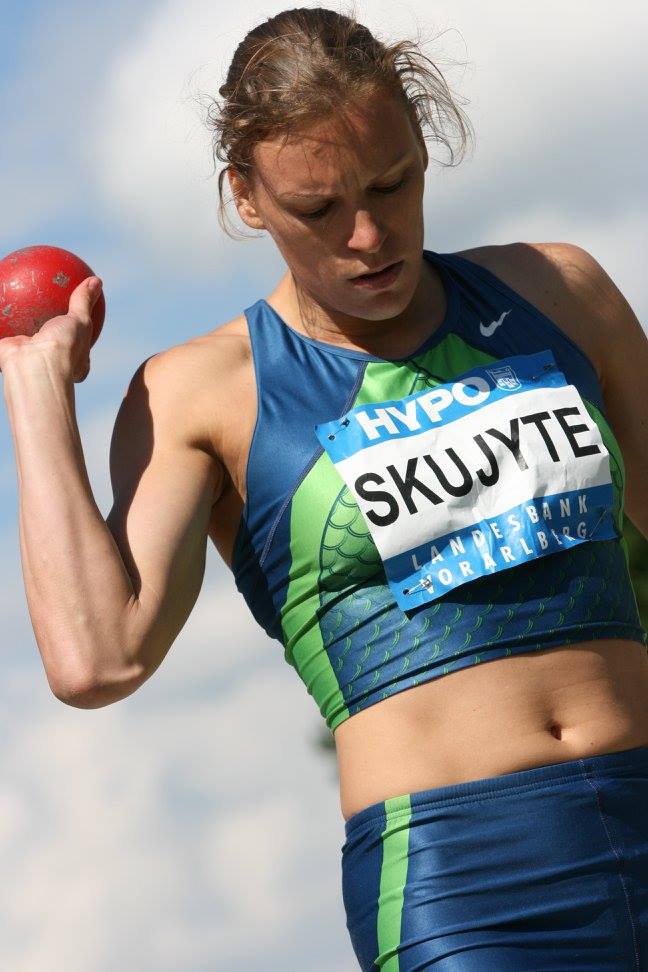
She competed in the shot at the World Championships in Berlin in 2009, the World Indoor Championships in Doha in 2010, and made the final at the European Championships in Barcelona in 2010. But to progress further and consistently reach finals, Austra had some choices to make.
“I was looking at how my competitors looked and how big they were. After a while I realised that even though I wanted to achieve a good performance in the shot put, I had this conflict – striving for a good performance, but not giving everything to achieve the right body composition.”
“So, after two years of trying, I decided to come back to the hep. I also had a really good sprint coach in Lithuania who asked me if I wanted to be a heptathlete again, and he was willing to help me with sprints.”
THE LOST OLYMPIC MEDAL
Austra had celebrated her 30th birthday in 2009 and on her return to the combined events in 2011 she quickly returned to the performances she had seen at her previous peak in 2004.
Her best performance in 2011 was 6338 at – you guessed it – the European Combined Events Cup, and she finished sixth in Götzis and seventh at the world championships in Daegu. She also won the silver medal at the European Indoor championships in Paris.
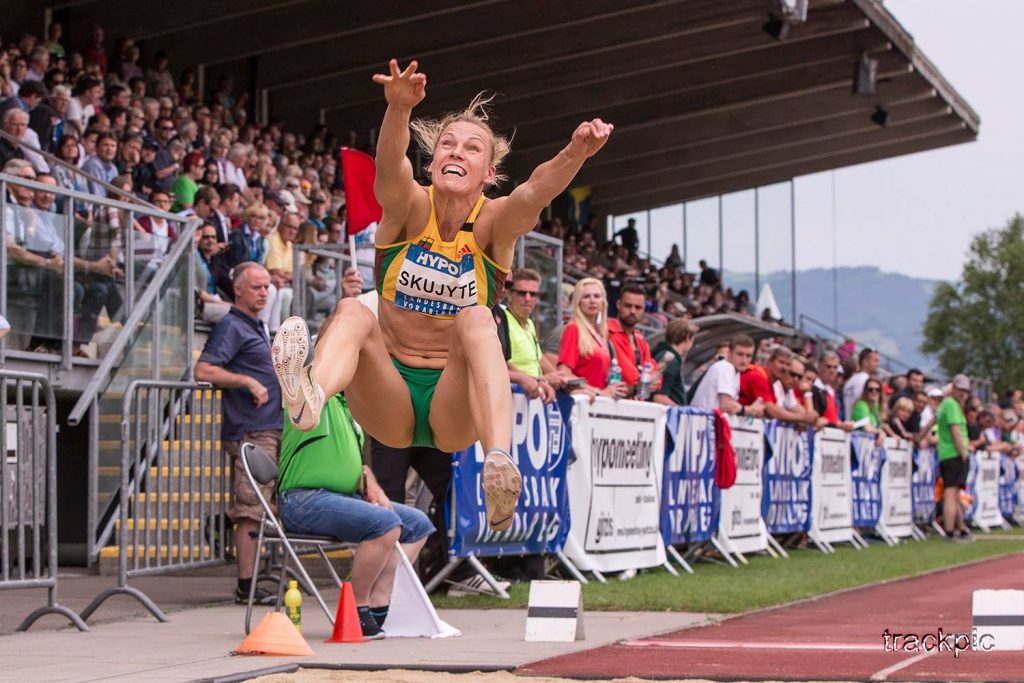
In 2012 Austra started the year with a bronze medal and a national record of 4802 – which still stands – in the pentathlon at the World Indoors in Istanbul. She opened her season in the heptathlon with second place at Götzis, in her first score over 6400 points (6493).
Everything was building towards an exciting Olympic Games for Skujytė in London in August.
Her first day in London started well, with 14.00s in the hurdles, just four hundredths from her lifetime best, and a PB of 1.92m in the high jump.
Coming into the competition, Austra had the second and third best shot puts of all time in heptathlon (in competitions over 5500), thanks to her 17.03m in Osaka and 17.02 in Beijing. The heptathlon best belonged to Natalya Dobrynska who had thrown 17.29m, also in Beijing, and they were the only two athletes who had ever thrown over 17.00m in a heptathlon.
In the third event, Austra gathered herself to throw 17.31m, her best ever outdoors outwith the 2009 and 2010 seasons when she focused on the heavy throws, and a new world heptathlon shot best.
Skujytė had leaped from 32nd place after the hurdles – for these were the days when the combined events fields were not restricted to 24 places – to fourth after the high jump, and then into the lead after the shot. Even though home favourite Jessica Ennis reclaimed the lead after the 200m, the stars seemed to be aligning for Skujytė to achieve a big score and potentially a medal on Day 2.
At the end of the first day, Austra was selected for a random drugs test. While her competitors all returned to the Olympic village for an evening of rest, recuperation and preparation for the second day of competition, Austra spent the entire evening stuck in doping control. She didn’t get back to her room until midnight.
The mid-competition disruption affected Skujytė, and she didn’t sleep well. That became a factor as the second day of competition progressed. It started off well enough, with a good 6.25m long jump and a 51.13m javelin which kept her in silver medal position after six events.
But in a field of fast 800m runners, Austra’s position was in danger. Although she ran what would be a season’s best of 2:20.59, Lilli Schwarzkopf of German and Tatyana Chernova of Russia ran ten seconds faster and overtook her for silver and bronze behind Ennis.
Even with a huge lifetime best score of 6599, Austra slid to fifth.
In a cruel irony, while the mid-competition drugs test that had sabotaged Skujytė’s performance showed that she was clean, two of the athletes who had finished ahead of her were not. Both Chernova and Lyudmyla Yosypenko of Ukraine were later stripped of their results, and Chernova of the bronze medal.
Chernova had scored 6628, just 29 points ahead of Austra. Had the Lithuanian run 2:18 for the 800m or thrown a metre and a half further in the javelin – both well within her personal best marks – she would have won bronze there and then. But the disruption of the previous evening had affected her too much.
Austra was eventually recognised as the true Olympic 2012 bronze medallist and received her medal in 2018. But by that time, the coach who had been instrumental to her improvement had passed away. Aleksas Stanislovaitis never got to see his charge on the Olympic podium, and never got to see Austra receive her medal.
Skujytė has shown compassion to her competitors who were found to be doping, recognising that they made have had little say in the systems in their home nations. But it took her a long time to come to terms with those circumstances of that first day in London.
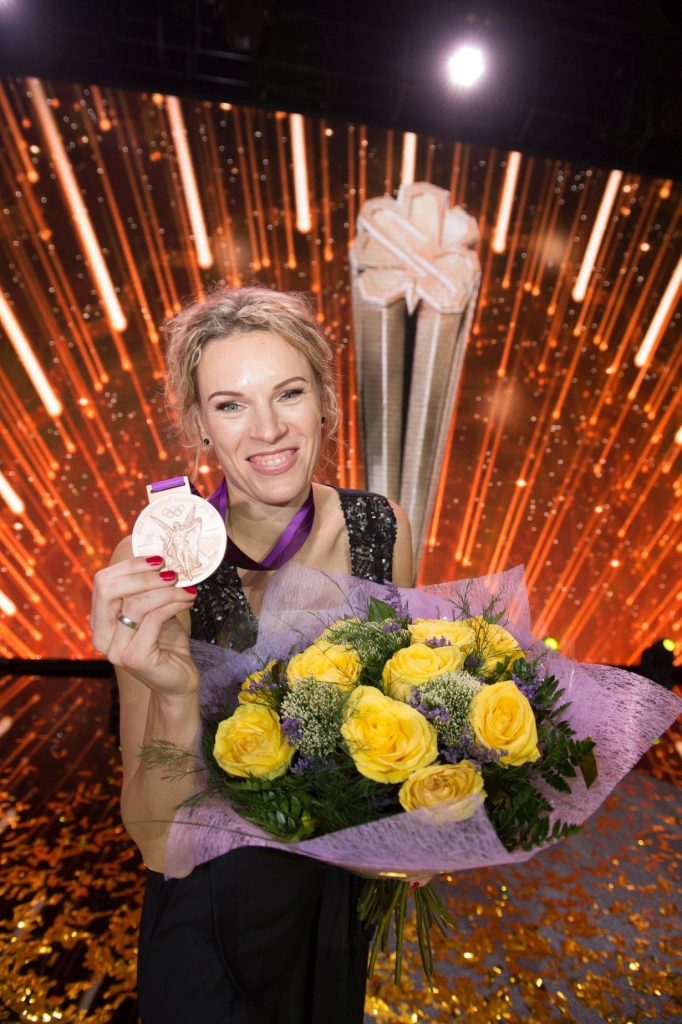
“For two years after 2012 I was really down about sports, and it was hard for me to talk about it. I was really crushed by this competition. I thought it was not fair to pull me out of the field – only me. I did not even realise this could happen. Before the 200m I was thinking “should I go to the bathroom?” If I had even an idea that this could happen, I wouldn’t have gone, and it would be easier for me to give the sample. It’s still hard to talk about.”
“And then my coach died in between 2012 and the time when I ended up being third. You think “it’s just a few years later, it doesn’t matter.” But he wasn’t there with me to celebrate.”
The delay mattered. It mattered a lot.
Austra continued competing for a few more years – “I was so shooting for one more Olympic Games in Rio, but my achilles just did not let me prepare very well” – but finally retired in 2017 as she approached her 38th birthday. One of her final achievements was to finish second at yet another European Cup competition, now the European Team Championships, in Spain.
“It was important for Lithuania because it was a team competition. And it just was always a part of summer season. NCAA ends up in May, and then another big competition in August, so this time was good in the schedule to do the hep, and then four weeks later do another one.”
Austra’s career had spanned 18 years at the highest level of competition.
“It was funny, when I competed with Sabine Braun I was thinking, she’s way too old for the heptathlon. She should quit!”
“But then when I got older, even older than her while competing I realised that actually its maybe not that bad at this age to still compete! But when you’re younger, you just think – ok, you need to quit!” she laughs.
THE DECATHLETE
If longevity was one defining factor of Austra’s career, then another was that she was not a “typical” heptathlete. While she was able to reach the highest level of heptathlon, the event undersold the true range of Austra’s athletic ability. And so, there was one more string to this ultimate’s athlete’s bow.
“In the heptathlon, you have a really big advantage if you’re really fast. I’m not very fast.”
“In decathlon, for example with the discus, there is less of a role for speed. So, you can be an all-round athlete. With decathlon there are more equal opportunities.”
Rewinding to 2000, when Austra first arrived in the USA her coach at Kansas State was Cliff Rovelto. Rovelto had guided the 2003 world champion Tom Pappas and 2005 world championships bronze medallist Attila Zsivoczky, among others, to the highest level of combined events. He also coached Sheila Burrell, instrumental in Austra’s move to the USA, who went on to place third in Edmonton in 2001, and fourth in Athens in 2004.
Cliff reflects on his first impressions of Austra in 2000.
“After the Games were over, we made contact with each other. It was actually Thanksgiving when I did a home visit in the fall of 2000. Then she started school in the January of 2001. She was a fine athlete, and at that point her PR was just over 6000 points.”
“Austra came in as a relatively strong thrower, but over the next couple of years, her throws improved tremendously. She went from 14 metres to 17 metres in the shot. And then we also started playing around with the discus. Initially it was just kind of fun, but in the back of my mind, I’m thinking decathlon.”
“The women’s decathlon had been approved as event,” Cliff recalls, “and there was a plan for how it was going to introduced. I began to talk to Austra about it. I said, ‘I think you would be a fine decathlete.’ Like a lot of athletes, when she first heard that, I don’t think she was all that excited about it. I think the main reason was the 1500m, and the 400 metres. And the pole vault was something that she never envisioned herself doing. But she became more receptive.”
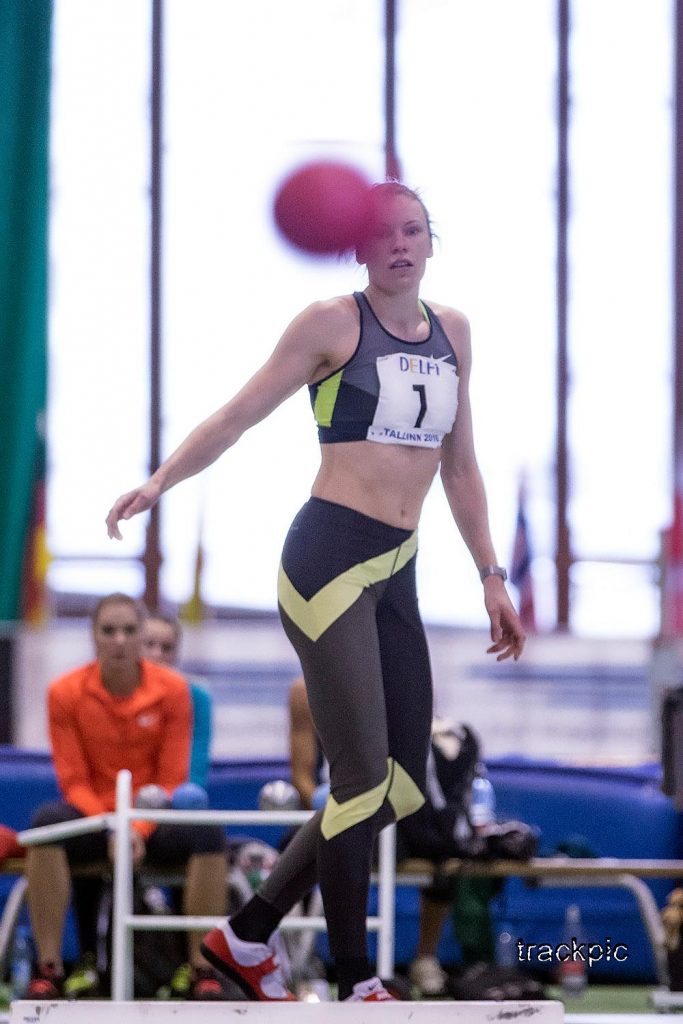
Austra remembers the conversation too. “Coach Rovelto asked me if I wanted to try decathlon. I already threw discus, and competed at the Big 12 in discus, so that was already something I’d done. So, it was only the pole vault. And I actually had fun with it. We tried vaulting with a stiff pole that didn’t bend too much, but for 3.20m, it was enough.”
Austra’s first time encountering ten events was a small affair, with just four athletes.
“Decathlon was a really, really fun experience, especially the first one I did. There were four athletes, some from Kansas State. One was a pole vaulter, who did heptathlon as a second event. So, it was easy for her. Another was a heptathlete, who learned pole vault to compete. And another, from Missouri, was a pole vaulter who had done heptathlon before.”
“It wasn’t that hard, and I really enjoyed it. And actually, the 1500m went really well! Something didn’t work at the start, and they had to stop us after 30m, and we walked back. And I asked the girls ‘do you think that was a good pace?’ Because I had just no idea! But everything turned out really, really well.”
Like most elite decathletes, Austra wasn’t thrilled by the 1500m, particularly not the prospect of having to start it twice. But Cliff was more optimistic. “To be perfectly honest, we didn’t spend any time training for the 1500, really. I thought that her 1500 would be, relatively speaking, better than her 800m. She thought I was out of my mind. But it proved to be true.”
At that time, the world record in decathlon was held by Marie Collonvillé of France, who had scored 8150 in Talence in 2004.
“We looked at her result,” Austra recalls “and we were like, ok, we’re going to try and shoot and make it better. At that time, it was something I did between the winter and summer season for fun. But I always had in mind that in 2015 or 2016, decathlon could be in a major competition.”
“Coach Rovelto talked to the head coach at Missouri, and they arranged this decathlon for women, with everything arranged so that a record would count.”
On 14 April 2005 in Columbia, Missouri, Austra got ready to aim for Collonvillé’s mark. Her marks:
100m 12.49s, long jump 6.12m, shot 16.42m, high jump 1.78m, 400m 57.19s
100m hurdles 14.22s, discus 46.19m, pole vault 3.10m, javelin 48.78m, 1500m 5:15.86s
Austra soared past Collonvillé’s mark to score 8358. The scoring tables for women’s and men’s combined events are not directly comparable but, for context, the qualifying mark for the 2021 Olympic Games decathlon for men was 8350 points.
Austra’s mark remains the decathlon world record. But it could have, and should have, been more.
At the time, when women competed in decathlon the “official” order involved reversing the middle events between the two days. So, on the first day the athletes would compete in the 100m, discus, pole vault, javelin and 400m; and on the second day 100m hurdles, long jump, shot, high jump and 1500m.
When men would be throwing the javelin as their penultimate event, women were encountering the high jump.
The protocol was grounded in a sexist attitude to female decathletes, who were considered an inconvenience to meeting organisers already running a men’s decathlon.
“The reason for flipping the events was because people felt like their facilities couldn’t handle it. Which is nonsense,” says Rovelto.
“No one wants to do a high jump at the end of day two” confirms Austra. “In the hep, we have it as a second event, and we’re all really warmed up after hurdles and ready to high jump. But it’s a challenge in the dec because you’re not that fresh.”
However, Austra’s punishing NCAA experience had equipped her perfectly for the challenge.
“In one of the Big 12 competitions, I did a total of 11 events. I did the hep, and I also did the long jump, high jump, shot and discus. It was over four days, and the very last of the eleven was the high jump. I remember that I could run, but I could not take off, and I was forcing myself to take off. And it just doesn’t work. But in the decathlon, it wasn’t that bad.”
At that time her PB was around 1.85m, although she would go on to jump 1.92m in 2012.
Cliff adds, “Austra developed into a pretty good high jumper.”
“But I told her, listen, these girls that are jumping 1.90 plus in the heptathlon are not going to jump 1.90m in the decathlon if they flip those events around. But Austra – being the type of athlete she was, and as strong as she was – was able to jump 1.83m in the ninth event, which is very good.”
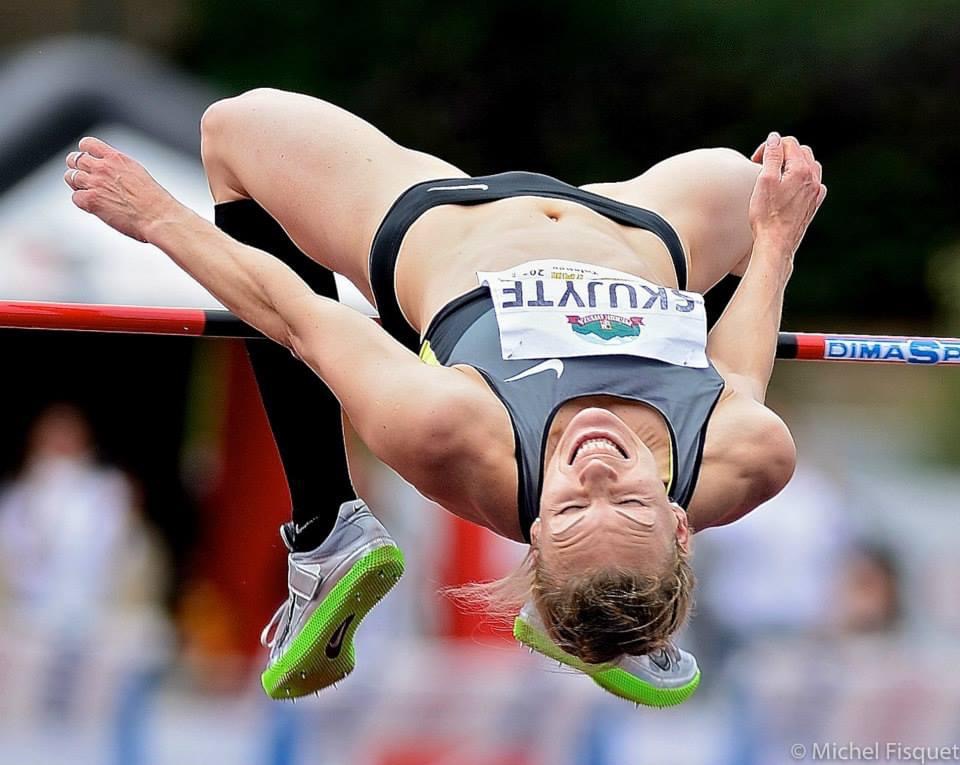
In recent years, the USA’s Jordan Gray has been leading a growing community of female decathletes around the world who want to have the opportunity to compete at decathlon. Jordan’s score of 8246 in San Mateo in 2021 is an American record, and the second best of all time, ahead of Collonvillé.
Gray’s score was with the correct order and the World Athletics technical rules now allow for a decathlon for women to be run in either order.
That raises the question of what might have been if Skujytė had been permitted to compete in a true decathlon. Would she have scored higher in Columbia?
“Yes, I think so,” declares Cliff Rovelto. “My personal opinion is she could have scored higher. And I think had Austra continued to train for the decathlon, if they hadn’t eliminated the plan to make that move, she could have scored significantly higher than what she did. And with the normal order, it’s a different measure. It’s a different event.”
Almost twenty years on from Austra’s decathlon feats, the opportunities for women to compete over ten events are growing. And, contrary to the view of some of those who dismiss the idea that young girls might dream of competing to be the world’s greatest athlete, the movement is not confined to the United States.
In July 2022, the Meeting D’Epreuves Combinee Nana-Djimou in Montreuil provides the opportunity for women to compete in decathlon. And according to French decathlon blog Décapassion, the organisers of Decastar are considering including a decathlon in their meeting in Talence in 2023.
So, what message does Austra have for young female decathletes who look to her for inspiration?
“It’s nice to have a world record. It’s really nice to be in the Guinness Book of World Records! But – I want them to break my record. I want them to continue their desire to perform well in the decathlon and achieve that.”
